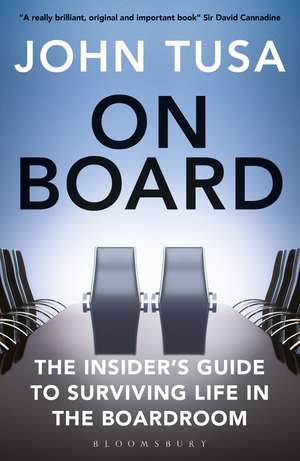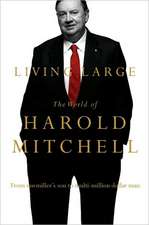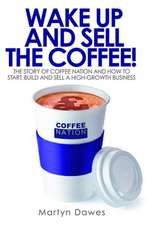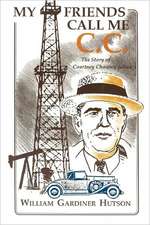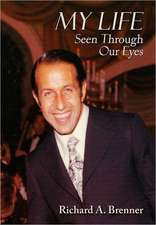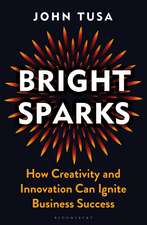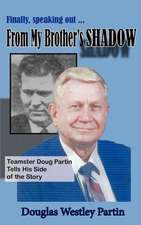On Board: The Insider's Guide to Surviving Life in the Boardroom
Autor John Tusaen Limba Engleză Paperback – 13 oct 2021
| Toate formatele și edițiile | Preț | Express |
|---|---|---|
| Paperback (1) | 60.72 lei 3-5 săpt. | +27.09 lei 7-13 zile |
| Bloomsbury Publishing – 13 oct 2021 | 60.72 lei 3-5 săpt. | +27.09 lei 7-13 zile |
| Hardback (1) | 126.79 lei 3-5 săpt. | +20.63 lei 7-13 zile |
| Bloomsbury Publishing – 19 aug 2020 | 126.79 lei 3-5 săpt. | +20.63 lei 7-13 zile |
Preț: 60.72 lei
Preț vechi: 80.65 lei
-25% Nou
Puncte Express: 91
Preț estimativ în valută:
11.62€ • 12.09$ • 9.59£
11.62€ • 12.09$ • 9.59£
Carte disponibilă
Livrare economică 22 martie-05 aprilie
Livrare express 08-14 martie pentru 37.08 lei
Preluare comenzi: 021 569.72.76
Specificații
ISBN-13: 9781472976024
ISBN-10: 1472976029
Pagini: 240
Dimensiuni: 129 x 198 x 18 mm
Greutate: 0.17 kg
Editura: Bloomsbury Publishing
Colecția Bloomsbury Business
Locul publicării:London, United Kingdom
ISBN-10: 1472976029
Pagini: 240
Dimensiuni: 129 x 198 x 18 mm
Greutate: 0.17 kg
Editura: Bloomsbury Publishing
Colecția Bloomsbury Business
Locul publicării:London, United Kingdom
Caracteristici
The sample tales and case studies will lend themselves to op-ed pieces on the successes and failures of corporate boards, which John would be able to write.
Notă biografică
Sir John Tusa is a British arts administrator, author, journalist and former presenter of BBC's Newsnight. He is the co-chairman of the European Union Youth Orchestra and was formerly the managing director of the BBC World Service and the Barbican Arts Centre.
Recenzii
'On
Board'
is
a
serious
story
lightly
told,
with
numerous
hints
and
tips
along
the
way
on
how
boards
behave
and
how
they
should.
Every
board
member
should
read
it...
and
learn.
John Tusa is one of the bravest and most thoughtful public servants of a generation, and one of the people I admire most in British public life.
John Tusa deals with the great and seldom asked questions: why do chairs and chief executives not get on? Why do boards make the wrong appointments? What does a great board look like? His answers - based on huge experience - are vital reading for chairs and trustees everywhere. This is a book on an important subject full of insight and interest: essential reading!
Part primer, part memoir, part history, laced with psychology and social anthropology,On Boardis an arresting and enlightening survival guide for anyone who aspires to sit on a not-for-profit board. It makes an eloquent case for the public value of the independent and good governance of our intellectual and cultural institutions - and the inherent obstacles to achieving it. John Tusa's case studies, from the many distinguished boards on which he has served and chaired, provide a serious and authoritative analysis of the tenets of institutional governance. This is also a riveting and, at times, excruciatingly candid account of personal learning painfully acquired in what he describes as one of "the most demanding complex and taxing activities in the world of public life".On Boardcharts the perilous navigation between the Scylla and Charybdis of personal rivalries and collective prevarication on which so many boards can come to grief. Anyone who has served as a Trustee will recognise his description of boards' capacities for resilience and dysfunctionality, and, at their centre, the delicate chemistry of the CEO/Chair relationship. Anyone asked to join such a board will be well advised to learn from Tusa how codes, management theory and mission statements cannot substitute for decency, humanity and rigour, so much more difficult to achieve than to proscribe. In the end, good governance depends on good behaviour.
For anyone considering joining a board, especially one in the arts, this is an excellent guide for what awaits them. It gives a clear sense of how the complex issues and relationships are handled from someone who was there, and lessons in good governance have rarely been so fluently expressed. And for those interested in many leading characters of the London arts scene over the past 20 years, this is a hugely entertaining read.
With outstanding insight, John weaves his way elegantly through misunderstandings, personal ambition, indecision, and incompetence to illustrate with clarity, the consequences of flawed Chairmanship, board composition, mistaken beliefs, and finally the privilege and honour of being part of a Board that gets it right.
One of the truly great and good, John Tusa has led many of Britain's cultural institutions and led them brilliantly. This book explains, modestly but straight-forwardly, how he has dealt with boards of trustees as helmsman, nanny, confessor, policeman, plotter, and Scout leader. Necessary reading for anyone involved in schools, arts organisations or other non-profits.
John Tusa is one of the bravest and most thoughtful public servants of a generation, and one of the people I admire most in British public life.
John Tusa deals with the great and seldom asked questions: why do chairs and chief executives not get on? Why do boards make the wrong appointments? What does a great board look like? His answers - based on huge experience - are vital reading for chairs and trustees everywhere. This is a book on an important subject full of insight and interest: essential reading!
Part primer, part memoir, part history, laced with psychology and social anthropology,On Boardis an arresting and enlightening survival guide for anyone who aspires to sit on a not-for-profit board. It makes an eloquent case for the public value of the independent and good governance of our intellectual and cultural institutions - and the inherent obstacles to achieving it. John Tusa's case studies, from the many distinguished boards on which he has served and chaired, provide a serious and authoritative analysis of the tenets of institutional governance. This is also a riveting and, at times, excruciatingly candid account of personal learning painfully acquired in what he describes as one of "the most demanding complex and taxing activities in the world of public life".On Boardcharts the perilous navigation between the Scylla and Charybdis of personal rivalries and collective prevarication on which so many boards can come to grief. Anyone who has served as a Trustee will recognise his description of boards' capacities for resilience and dysfunctionality, and, at their centre, the delicate chemistry of the CEO/Chair relationship. Anyone asked to join such a board will be well advised to learn from Tusa how codes, management theory and mission statements cannot substitute for decency, humanity and rigour, so much more difficult to achieve than to proscribe. In the end, good governance depends on good behaviour.
For anyone considering joining a board, especially one in the arts, this is an excellent guide for what awaits them. It gives a clear sense of how the complex issues and relationships are handled from someone who was there, and lessons in good governance have rarely been so fluently expressed. And for those interested in many leading characters of the London arts scene over the past 20 years, this is a hugely entertaining read.
With outstanding insight, John weaves his way elegantly through misunderstandings, personal ambition, indecision, and incompetence to illustrate with clarity, the consequences of flawed Chairmanship, board composition, mistaken beliefs, and finally the privilege and honour of being part of a Board that gets it right.
One of the truly great and good, John Tusa has led many of Britain's cultural institutions and led them brilliantly. This book explains, modestly but straight-forwardly, how he has dealt with boards of trustees as helmsman, nanny, confessor, policeman, plotter, and Scout leader. Necessary reading for anyone involved in schools, arts organisations or other non-profits.
